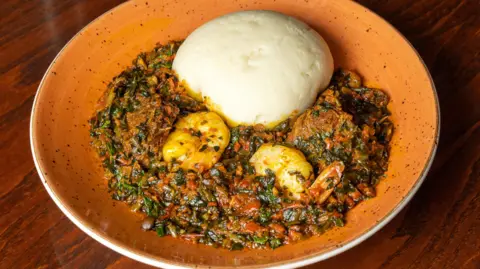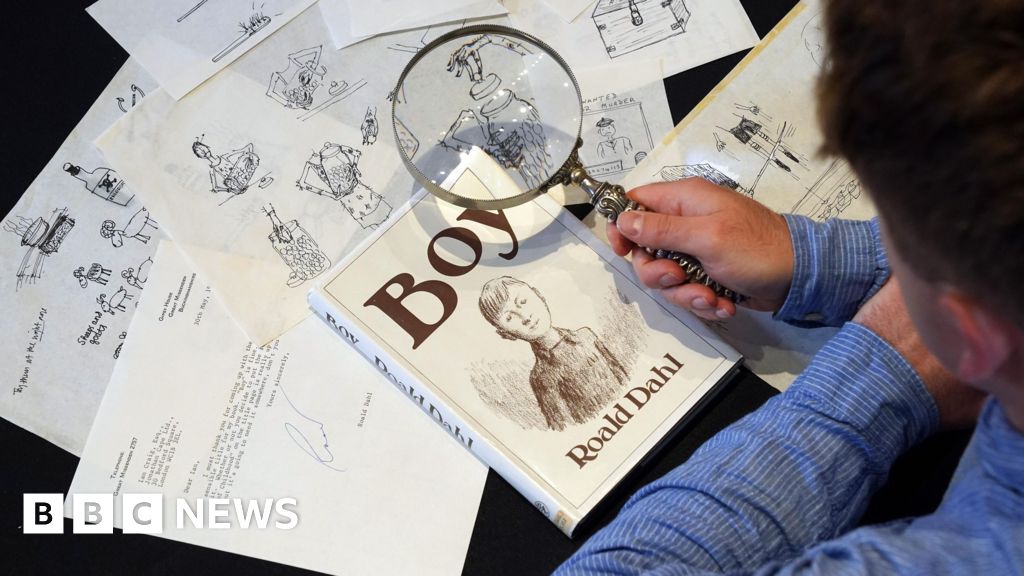ARTICLE AD BOX

 Getty Images
Getty Images
Beef Efo Riro is a native vegetable stew
Have you ever tried fufu or efo riro? Or moi moi?
If you haven’t already, you might do soon, because they’re examples of Nigerian cooking that are rapidly moving into the mainstream of UK dining.
Nigerian restaurants are appearing on the high street and the vibrant West African cuisine is hitting the supermarket shelves, with Sainsbury's offering ready-made meals of popular Nigerian dishes such as Gizdodo, Eforiro and Ayamase.
“The big trend we have observed over the past eight years or so is the rise of west African and specifically Nigerian fine dining restaurants,” says Lumina Intelligence, market researchers specialising in the restaurant sector.
The Nigerian foodservice market is estimated to be worth $10bn in 2024 and is expected to reach $17bn in 2029.
A 2018 BBC report from food experts predicted West African food will be "the next big food trend” and a few years later it is excelling.
What makes Nigerian food stand out?
Known for its vivid colours, bold flavours and unique textures, it's food for sharing, bringing people together. It's often eaten using your hands.
If you went into a Nigerian restaurant, you might be tempted to try dishes such as:
- Efo riro – a native vegetable stew commonly of the Yoruba people. The spinach-based stew is cooked in a thick oil. It has a red sauce with different types of meats or no meat, depending on preference.
- Fufu – pounded cassava and boiled water mixed together to form a thickness that accompanies traditional stews. Other popular variations of fufu are amala, eba or semolina.
- Moi moi - this is a boiled bean pudding made with a mixture of peeled black-eyed beans, onions, egg, red peppers, and often fish.
- Gizdodo – a combination of gizzard, bell peppers, onions and fried plantains mixed in a tomato-based stew.
- Ayamase – a very spicy stew with an assortment of tender meats, locust beans, boiled egg and blended peppers. This is eaten with rice and plantain.
The rise of Nigerian food reflects the UK’s growing Nigerian community. It’s been boosted by viral TikTok trends of people trying dishes. Interest has also been heightened by some high-profile fans.
Hugh Jackman, the Australian movie star, was spotted at Nigerian chain restaurant Enish in London’s Oxford Street last year, after his children recommended it. Enish now has branches across the world, from Dubai to Lewisham.
Beyonce’s charity, the Beygood Foundation, donated £8,000, which helped siblings Emeka and Iffy Frederick continue sharing Nigerian cuisine at their Chuku’s restaurant in north London.
It helped a restaurant that had opened just before the Covid pandemic to survive through the “absolute nightmare” of lockdown.
Chuku’s, which claims to be the world’s first Nigerian tapas restaurant, describes its ethos as sharing the best of Nigerian culture with feel-good vibes.
Michelin star chef, Adejoké (Joké) Bakare, made gastronomic history earlier this year by becoming the UK’s first black female chef to win a Michelin star and only the second in the world.
Joké opened Chishuru in Brixton in September 2020 as a three-month pop-up, after winning the Brixton Village competition in south London. Following a rave review from food critic, Jay Rayner, the pop-up became permanent.
Joké then operated pop-ups at a series of central London venues, before moving Chishuru to its permanent new home in London’s West End in September 2023.
She hopes this recognition means Michelin will "start looking at the continent".
Growing popularity
Among the new wave of Nigerian restaurants is Tasty African Food, which has recently opened its 28th branch in Sittingbourne, Kent.
Business development manager, Simi Olaleye, said the growing interest in exploring Nigerian food is due to “people’s palate changing and the world becoming more international”.
“A lot of customers want to try African food... they are already familiar with our music and culture with the likes of Wizkid and Burna Boy,” he said.
“When you try West African food, Nigerian food in particular, especially our jollof rice, moi moi, our suya, it has an authentic taste to it.”
Food is about sharing cultures, with cooking often a gateway to finding out about other communities in a way that’s as natural as the food on the plate.
People might want to try out new flavours and then find they’re biting into a whole culture and history.
Nigeria is the biggest population in Africa and over 270,000 Nigerians in England and Wales.
Will jollof or efo riro follow in the footsteps of tikka masala or chow mein to become UK favourites?

 8 months ago
34
8 months ago
34








 English (US) ·
English (US) ·